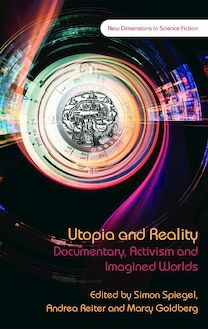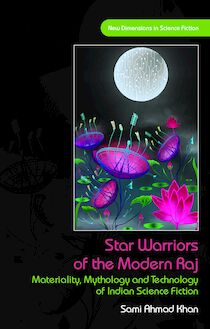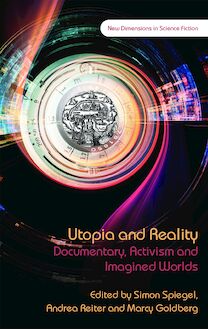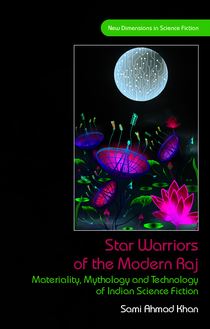-
 Univers
Univers
-
 Ebooks
Ebooks
-
 Livres audio
Livres audio
-
 Presse
Presse
-
 Podcasts
Podcasts
-
 BD
BD
-
 Documents
Documents
-
- Cours
- Révisions
- Ressources pédagogiques
- Sciences de l’éducation
- Manuels scolaires
- Langues
- Travaux de classe
- Annales de BEP
- Etudes supérieures
- Maternelle et primaire
- Fiches de lecture
- Orientation scolaire
- Méthodologie
- Corrigés de devoir
- Annales d’examens et concours
- Annales du bac
- Annales du brevet
- Rapports de stage
La lecture à portée de main
Vous pourrez modifier la taille du texte de cet ouvrage
Découvre YouScribe en t'inscrivant gratuitement
Je m'inscrisDarwinian Feminism and Early Science Fiction , livre ebook
Découvre YouScribe en t'inscrivant gratuitement
Je m'inscrisEn savoir plus
Vous pourrez modifier la taille du texte de cet ouvrage
En savoir plus

Description
Darwinian Feminism in Early Science Fiction provides the first detailed scholarly examination of women’s SF in the early magazine period before the Second World War. Tracing the tradition of women’s SF back to the 1600s, the author demonstrates how women such as Margaret Cavendish and Mary Shelley drew critical attention to the colonial mindset of scientific masculinity, which was attached to scientific institutions that excluded women. In the late nineteenth century, Charles Darwin’s theory of sexual selection provided an impetus for a number of first-wave feminists to imagine Amazonian worlds where women control their own bodies, relationships and destinies. Patrick B. Sharp traces how these feminist visions of scientific femininity, Amazonian power and evolutionary progress proved influential on many women publishing in the SF magazines of the late 1920s and early 1930s, and presents a compelling picture of the emergence to prominence of feminist SF in the early twentieth century before vanishing until the 1960s.
Acknowledgements
Introduction
1 Scientific Masculinity and its Discontents
2 Charles Darwin, Gender and the Colonial Imagination
3 Evolution’s Amazons: Colonialism, Captivity and Liberation in Feminist Science Fiction
4 Women with Wings: Feminism, Evolution and the Rise of Magazine Science Fiction
5 Darwinian Feminism and the Changing Field of Women’s Science Fiction
Works Cited
Index
Sujets
Informations
| Publié par | University of Wales Press |
| Date de parution | 28 mars 2018 |
| Nombre de lectures | 0 |
| EAN13 | 9781786832313 |
| Langue | English |
Informations légales : prix de location à la page 0,2850€. Cette information est donnée uniquement à titre indicatif conformément à la législation en vigueur.
Extrait
New Dimensions in Science Fiction
Darwinian Feminism and Early Science Fiction
New Dimensions in Science Fiction
Series Editors
Professor Pawel Frelik Maria Curie-Sklodowska University
Professor Patrick B. Sharp California State University, Los Angeles
Editorial Board
Dr. Grace Dillon Portland State University
Dr. Tanya Krzywinska Falmouth University
Dr. Isiah Lavender III Louisiana State University
Prof. Roger Luckhurst Birkbeck University of London
Dr. John Rieder University of Hawai’i
Darwinian Feminism and Early Science Fiction
Angels, Amazons and Women
Patrick B. Sharp
© Patrick B. Sharp, 2018
All rights reserved. No part of this book may be reproduced in any material form (including photocopying or storing it in any medium by electronic means and whether or not transiently or incidentally to some other use of this publication) without the written permission of the copyright owner except in accordance with the provisions of the Copyright, Designs and Patents Act 1988. Applications for the copyright owner’s written permission to reproduce any part of this publication should be addressed to the University of Wales Press, 10 Columbus Walk, Brigantine Place, Cardiff CF10 4UP.
www.uwp.co.uk
British Library CIP Data
A catalogue record for this book is available from the British Library.
ISBN 978-1-78683-229-0
eISBN 978-1-78683-231-3
The right of Patrick B. Sharp to be identified as author of this work has been asserted in accordance with sections 77 and 79 of the Copyright, Designs and Patents Act 1988.
The publisher has no responsibility for the persistence or accuracy of URLs for any external or third-party internet websites referred to in this book, and does not guarantee that any content on such websites is, or will remain, accurate or appropriate.
Cover image: ‘Goddess of the Golden Flame’, cover of Fantastic Adventures, July 1947. By permission, Grapefruit Moon Gallery, Minneapolis.
For Sharon and Tonks
Series Editors’ Preface
Science fiction (SF) is a global storytelling form of techno-scientific modernity which conveys distinct experiences with science, technology and society to a wide range of readers across centuries, continents and cultures. The New Dimensions in Science Fiction series aims to capture the dynamic, worldwide and media-spanning dimensions of SF storytelling and criticism by providing a venue for scholars from multiple disciplines to explore their ideas on the relations of science and society as expressed in SF.
Contents
Acknowledgements
Introduction
1 Scientific Masculinity and its Discontents
2 Charles Darwin, Gender and the Colonial Imagination
3 Evolution’s Amazons: Colonialism, Captivity and Liberation in Feminist Science Fiction
4 Women with Wings: Feminism, Evolution and the Rise of Magazine Science Fiction
5 Darwinian Feminism and the Changing Field of Women’s Science Fiction
Works Cited
Acknowledgements
This project began with a grant from the American Communities Program at Cal State LA back in 2009. Thanks to Maria Karafilis and my ACP colleagues for their support throughout the long road that led to the completion of this book. I am grateful to the Science Fiction Research Association for the research grant that helped fund a portion of my research on women science fiction authors of the 1920s and 1930s, and in particular I would like to thank Ritch Calvin, Susan George and Jason Ellis for their faith in this project. Thanks to the Office of the Provost and the Deans of Arts and Letters at Cal State LA for their support of the sabbatical that launched my work on the history of science and evolutionary discourse. Thanks to my colleagues with whom I collaborated at various stages of this project, especially Kimberly Hamlin, John Bruni, Sherryl Vint and Lisa Yaszek. I had the pleasure of working with some truly exceptional students during the process of researching this book, especially Joseph Aragon, Michelle Blackwell, Marissa Elliott-Baptiste and Mary Vasisth. I hope they learned as much from me as I did from them in the course of our independent studies together.
As with all recovery projects, I am deeply indebted to the amazing librarians – the true guardians of our past, present and future – with whom I worked as I tried to locate and examine the texts that are the focus of this book. Special thanks to Melissa Conway, Andy Sawyer and Daniel Lewis along with the staffs of the Eaton Collection at the University of California, Riverside, the Science Fiction Foundation Collection at the University of Liverpool Library, and the Dibner Collection at the Huntington Library.
Thanks to Sarah Lewis and the amazing people at the University of Wales Press for all of their efforts during the final stages of writing and revising this project, and to my co-editor Pawel Frelik for his hard work during the creation and development of this book series. Thanks also go to the peer reviewers for their thoughtful and precise feedback on the proposal and manuscript.
Thanks to Isiah Lavender III and the University Press of Mississippi for permission to reuse a few revised paragraphs from my essay ‘Questing for an Indigenous Future’ which first appeared in Black and Brown Planets (2014). Thanks also go to Rob Latham and Oxford University Press for permission to reuse several revised paragraphs from my essay ‘Darwinism’ which first appeared in The Oxford Handbook of Science Fiction (2014).
Special thanks to Sharon Sharp for all of her love and support during the process of researching and writing this book. And, as always, thanks to Savonia Sharp and Adelbert Sharp, to whom I owe everything.
Introduction
In Euro-American contexts, science fiction (SF) has long been a Darwinian genre. Of course, that is not all there is to SF – even SF in the Euro-American tradition – and much of this book argues that any such narrow understanding of the genre’s essence is fatally flawed. Historically speaking, however, when the genre first began to be called ‘scientifiction’ by publisher Hugo Gernsback in his famous April 1926 editorial – a label that was later amended to ‘science fiction’ – the plots, characterisations and framing logics of the genre were based firmly within a Darwinian paradigm (Gunn 2005: ix; Sharp 2014: 475–8). This evolutionary paradigm has been contested, revised and reconfigured countless times in many disciplines since the nineteenth century, but it still provides the basic foundation for scientific understandings of all organic life. As such, it constitutes a major portion of ‘the scientific megatext’ and its attendant ‘master narrative’ that is understood, shared and sometimes contested by writers and readers of SF (Attebery 2002: 41). Scholars of SF have long recognised the importance of evolution for the scientific extrapolations of authors such as H. G. Wells, whose evolutionary parables about class and technological dependence provided a touchstone for twentieth-century science fictioneers. That said, Darwin’s influence upon SF extended beyond such explicit scientific extrapolations: Darwin’s work intervened in the pre-existing genre systems that shaped SF, bringing with it Victorian assumptions about colonisation, progress and human nature. Developing a critical understanding of Victorian evolutionary science is therefore necessary to appreciate the meanings and importance of twentieth-century SF.
SF is also a genre where women have made influential contributions throughout its history, however far back that history is extended. Building on the work of Carol A. Kolmerten, Jane Donawerth has traced ‘a continuous literary tradition’ from Margaret Cavendish’s The Blazing World (1666) and Mary Shelley’s Frankenstein (1818) to the explosion of women’s SF in the 1960s and beyond (1997: xiv). Scholars such as Robin Roberts (1993), Justine Larbalestier (2002) and Lisa Yaszek (2008) have fleshed out major aspects of this tradition by respectively examining scientific discourse in SF by women, early SF magazine debates about gender, and the ‘galactic suburbia’ stories of the early Cold War. Anthologies such as Pamela Sargent’s Women of Wonder (1975), Larbalestier’s Daughters of Earth (2006) and Mike Ashley’s The Dreaming Sex (2010) collected stories written by women and made them much more accessible to fans and scholars alike. Sisters of Tomorrow (2016), the anthology that I recently co-edited with Lisa Yaszek, shows the scope of women’s contributions by collecting art, poetry, editorials, science writing and stories produced by women in magazine SF between 1926 and the mid-1940s. Together, such scholarship and anthologies have demonstrated beyond any reasonable doubt that women have always been important contributors and collaborators in the development of SF.
Like their male contemporaries, women science fictioneers of the early twentieth century wrestled with the meanings and possibilities provided by evolutionary science. However, many women SF writers adopted a more critical approach to evolution than their male counterparts, an approach that can be traced back to the work of feminists such as Mary E. Bradley Lane and Charlotte Perkins Gilman. The unique arguments and narratives produced by such Darwinian feminists provided an important foundation for SF written by women in the United States. Specifically, Darwin’s account of sexual selection provided the template for diagnosing the violence of patriarchal institutions that enslaved women. It also provided an account of the possible mechanisms for their emancipation. Women such as Clare Winger Harris, Leslie F. Stone and C. L. Moore fashioned stories in the 1920s and 1930s that imagined how women could evolve and progress in ways that made them the equals – and at times, the superiors – of violent and egotistical men. As I show in the pages that follow, Darwinian feminism merged with the legacy of Margaret Cavendish and Mary Shelley in the writing of these women and provided scient
-
 Univers
Univers
-
 Ebooks
Ebooks
-
 Livres audio
Livres audio
-
 Presse
Presse
-
 Podcasts
Podcasts
-
 BD
BD
-
 Documents
Documents
-
Jeunesse
-
Littérature
-
Ressources professionnelles
-
Santé et bien-être
-
Savoirs
-
Education
-
Loisirs et hobbies
-
Art, musique et cinéma
-
Actualité et débat de société
-
Jeunesse
-
Littérature
-
Ressources professionnelles
-
Santé et bien-être
-
Savoirs
-
Education
-
Loisirs et hobbies
-
Art, musique et cinéma
-
Actualité et débat de société
-
Actualités
-
Lifestyle
-
Presse jeunesse
-
Presse professionnelle
-
Pratique
-
Presse sportive
-
Presse internationale
-
Culture & Médias
-
Action et Aventures
-
Science-fiction et Fantasy
-
Société
-
Jeunesse
-
Littérature
-
Ressources professionnelles
-
Santé et bien-être
-
Savoirs
-
Education
-
Loisirs et hobbies
-
Art, musique et cinéma
-
Actualité et débat de société
- Cours
- Révisions
- Ressources pédagogiques
- Sciences de l’éducation
- Manuels scolaires
- Langues
- Travaux de classe
- Annales de BEP
- Etudes supérieures
- Maternelle et primaire
- Fiches de lecture
- Orientation scolaire
- Méthodologie
- Corrigés de devoir
- Annales d’examens et concours
- Annales du bac
- Annales du brevet
- Rapports de stage
















